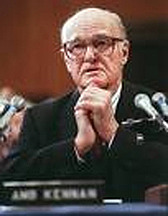George F. Kennan 1904–2005
Press Contact

George Frost Kennan, Professor Emeritus in the School of Historical Studies at the Institute for Advanced Study in Princeton, New Jersey, died yesterday evening at the age of 101.
Professor Kennan, an expert on the diplomatic history of Russia, the Soviet Union and U.S.-Soviet relations, is perhaps best known as the author of the "Long Telegram," dispatched in 1946 to Secretary of State James Byrnes proposing a new approach to U.S.-Soviet relations. The historic 8,000-word message defined the terms of the Cold War.
"George Kennan's long and distinguished professional life has been one of uncommon achievement in both statecraft and scholarship, and his record of accomplishment is remarkable in its breadth and depth," said Peter Goddard, Director of the Institute for Advanced Study. "He wrote perceptively about American foreign policy; did much to increase understanding of Russia and the Soviet Union, and provided intelligent, principled and courageous criticisms on other important issues."
James D. Wolfensohn, President, The World Bank, and Chairman, Board of Trustees, Institute for Advanced Study, stated, "George Kennan was one of the great treasures of the Institute, in his own field ranking alongside other former Institute colleagues, Albert Einstein and John von Neumann. We cherish his memory and his friendship."
Professor Kennan joined the Faculty of the Institute for Advanced Study in 1956, where he had been a Member since 1953. While the Institute was considered Professor Kennan's academic home, he moved between the diplomatic and academic worlds, serving as Ambassador to the Soviet Union in 1952 and to Yugoslavia in 1960-63. He was George Eastman Visiting Professor at Oxford (1957-58), and a University Fellow at Harvard (1965-69). In 1975, he co-founded the Kennan Institute for Advanced Russian Studies (as part of the Woodrow Wilson International Center for Scholars), Washington, D.C., which aims to provide the American public and policy-makers with a better understanding of the Soviet Union by improving Russian studies.
Prior to his tenure at the Institute, Professor Kennan pursued a distinguished career in the United States Foreign Service from 1926 to 1953, and received special training as a Soviet expert during his service in Germany in the 1930s. During the remainder of the 1930s, he served in Moscow, Vienna, and Prague at the time of the Nazi occupation of Czechoslovakia. He served in Berlin at the outbreak of World War II and in Moscow at the end of the war.
It was during this period of expanding Soviet influence in Europe that he dispatched the "Long Telegram." In it, he argued that the Soviet Union was "a political force committed fanatically to the belief that with the U.S. there can be no permanent modus vivendi" but that the problem could be met "without recourse to any general military conflict."
In 1946, he had left Moscow to become the first Deputy for Foreign Affairs of the newly-formed National War College. It was there that he wrote the original draft of "The Sources of Soviet Conduct." Subsequently published anonymously in the July 1947 issue of Foreign Affairs and famously signed with an "X," it proposed maintenance of a balance of power with the Soviet Union, an approach that came to be known as "containment." In 1947, he became Director of the Policy Planning Staff of the Department of State, and, in 1949, Counselor of the Department.
In 1950, J. Robert Oppenheimer, then the Director of the Institute for Advanced Study, invited Kennan, on leave from the Foreign Service, to come to the Institute as a Visitor. So began the long connection with an institution that permitted him the time for study, reflection, and those academic contacts which could lead to concomitant careers as scholar of American and European history, and as analyst of, as well as actor upon, the contemporary scene.
During his tenure at the Institute, Professor Kennan was the recipient twice of both the Pulitzer Prize and the National Book Award for his books Russia Leaves the War, Vol. I of Soviet-American Relations 1917-1920 (1956) and Memoirs, 1925-1950 (1967). He authored more than 20 books and many articles on the diplomatic history of Russia and the Soviet Union. Professor Kennan, who became Professor Emeritus in 1974, attributed his accomplishments in part to the Institute. "I can find no adequate words," he wrote, "in which to acknowledge the debt I owe to this institution."
Kennan's awards are numerous: the Testimonial of Loyal and Meritorious Service from the Department of State (1953), Princeton University's Woodrow Wilson Award for Distinguished Achievement in the Nation's Service (1976), the Albert Einstein Peace Prize (1981), the German Peace Prize (1982), the Franklin D. Roosevelt Foundation Freedom from Fear Medal (1987), the Presidential Medal of Freedom (1989), and the Distinguished Service Award from the Department of State (1994), to name a few. He received 29 honorary degrees and was a former President of the American Academy of Arts and Letters.
Among honors in his name are the George F. Kennan Chair in National Security Strategy at the National War College, and the George F. Kennan Professorship and Memberships established at the Institute for Advanced Study.
A memorial service will be held on Wednesday, April 6, at 11:00 a.m. at the Washington National Cathedral.